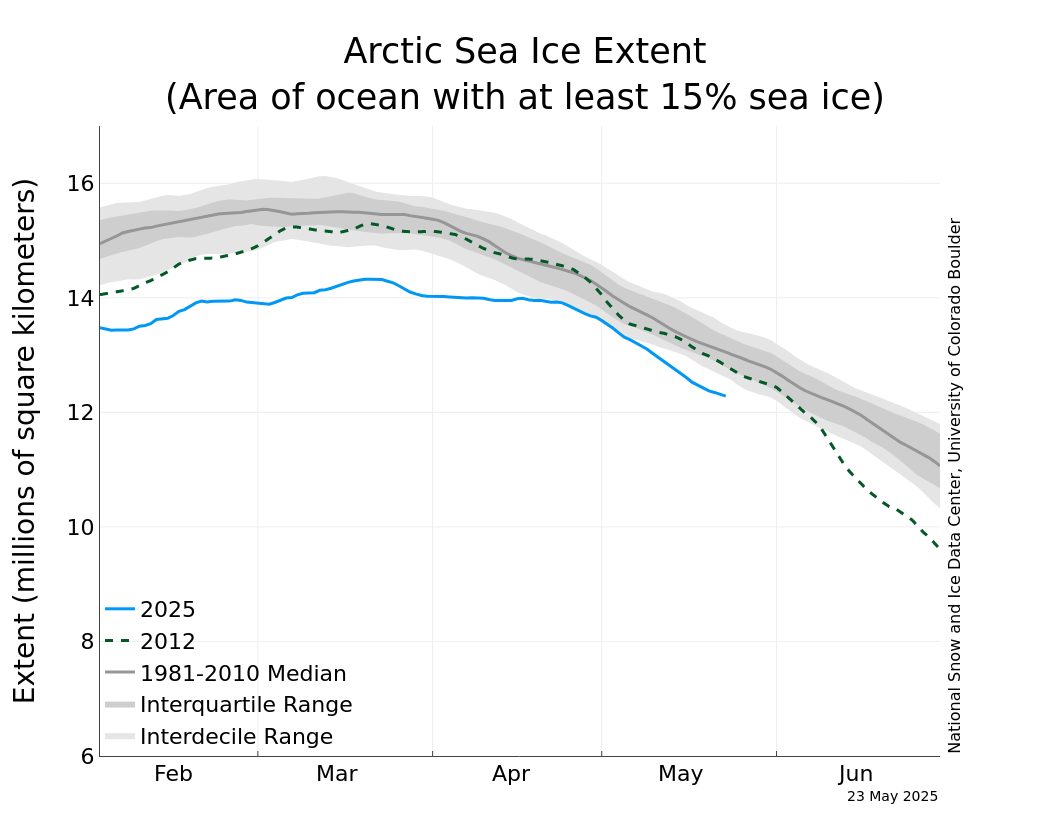Welcome to DU!
The truly grassroots left-of-center political community where regular people, not algorithms, drive the discussions and set the standards.
Join the community:
Create a free account
Support DU (and get rid of ads!):
Become a Star Member
Latest Breaking News
Editorials & Other Articles
General Discussion
The DU Lounge
All Forums
Issue Forums
Culture Forums
Alliance Forums
Region Forums
Support Forums
Help & Search
Environment & Energy
Related: About this forumTemporary slowdown in melting of Arctic sea ice, study finds
https://news.exeter.ac.uk/faculty-of-environment-science-and-economy/temporary-slowdown-in-melting-of-arctic-sea-ice-study-finds/Temporary slowdown in melting of Arctic sea ice, study finds
Russell Parton
Arctic sea ice has been melting at a slower rate for the past 20 years, despite human-induced global warming.
This comes at a time of record warming, debates about whether global warming is accelerating and decades of enhanced Arctic warming relative to the rest of the globe.
Climate modelling evidence suggests the finding is the result of ‘natural climate variations’ off-setting the human-driven loss of sea ice.
Scientists say this is a temporary slowdown that may continue for a further five to 10 years and, when it ends, is likely to be followed by faster-than-average sea ice decline.
…
England, M. R., Polvani, L. M., Screen, J., & Chan, A. C. (2025). Minimal Arctic sea ice loss in the last 20 years, consistent with internal climate variability. Geophysical Research Letters, 52, e2025GL116175. https://doi.org/10.1029/2025GL116175
Russell Parton
Arctic sea ice has been melting at a slower rate for the past 20 years, despite human-induced global warming.
This comes at a time of record warming, debates about whether global warming is accelerating and decades of enhanced Arctic warming relative to the rest of the globe.
Climate modelling evidence suggests the finding is the result of ‘natural climate variations’ off-setting the human-driven loss of sea ice.
Scientists say this is a temporary slowdown that may continue for a further five to 10 years and, when it ends, is likely to be followed by faster-than-average sea ice decline.
…
https://nsidc.org/sea-ice-today

3 replies
 = new reply since forum marked as read
Highlight:
NoneDon't highlight anything
5 newestHighlight 5 most recent replies
= new reply since forum marked as read
Highlight:
NoneDon't highlight anything
5 newestHighlight 5 most recent replies
Temporary slowdown in melting of Arctic sea ice, study finds (Original Post)
OKIsItJustMe
Aug 2025
OP
SSJVegeta
(2,052 posts)1. I imagine thats a good sign signaling that we still have a little bit of time left to correct things.
OKIsItJustMe
(21,667 posts)2. Sadly, that's not what the researchers say
https://news.exeter.ac.uk/faculty-of-environment-science-and-economy/temporary-slowdown-in-melting-of-arctic-sea-ice-study-finds/
…
Dr Mark England, who led the study while at the University of Exeter and is now at UC Irvine, said: “Summer sea ice conditions in the Arctic are at least 33% lower than they were at the beginning of the satellite record nearly 50 years ago.
“Given this – and the indisputable fact of human-driven climate change – it may seem surprising to find a temporary slowdown in Arctic sea ice loss.
“It is, however, entirely consistent with climate model simulations and is likely due to natural climate variability superimposed on the human-driven long-term trend. This is only a ‘temporary reprieve’ and before long the rate of sea ice decline will catch up with the longer term rate of sea ice loss.
“It’s like the analogy of a ball bouncing down a hill where the hill is climate change, given by Professor Ed Hawkins. The ball continues going down the hill but as it meets obstacles in its path, the ball can temporarily fly upwards or sideways and not seem to be travelling down at all – that trajectory is not always smooth but we know that at some point the ball will careen towards the bottom of the hill.”
…
Dr Mark England, who led the study while at the University of Exeter and is now at UC Irvine, said: “Summer sea ice conditions in the Arctic are at least 33% lower than they were at the beginning of the satellite record nearly 50 years ago.
“Given this – and the indisputable fact of human-driven climate change – it may seem surprising to find a temporary slowdown in Arctic sea ice loss.
“It is, however, entirely consistent with climate model simulations and is likely due to natural climate variability superimposed on the human-driven long-term trend. This is only a ‘temporary reprieve’ and before long the rate of sea ice decline will catch up with the longer term rate of sea ice loss.
“It’s like the analogy of a ball bouncing down a hill where the hill is climate change, given by Professor Ed Hawkins. The ball continues going down the hill but as it meets obstacles in its path, the ball can temporarily fly upwards or sideways and not seem to be travelling down at all – that trajectory is not always smooth but we know that at some point the ball will careen towards the bottom of the hill.”
…
SSJVegeta
(2,052 posts)3. I first stopped reading before the anaology and well...